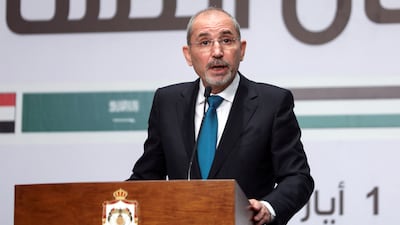Jordan’s Deputy Prime Minister and Minister of Foreign Affairs Ayman Safadi called for international investment in conflict-ravaged Syria's infrastructure to speed up voluntary refugee returns.
Mr Safadi made the remarks during a visit to the capital Damascus, where he met his counterpart Faisal Mekdad as well as Syrian President Bashar Al Assad.
The visit to Syria is his second since February and comes two months after Amman hosted a meeting that paved the way for Damascus's return to the Arab League.
Jordan, which shares a border with Syria, hosts about 1.3 million Syrian refugees.
“We have offered everything we can to ensure them a dignified life,” Mr Safadi said at a news conference following his meetings.
“But what we are sure of is that the refugees’ futures lie in their country.”
In a statement released by Mr Al Assad's office, the Syrian President echoed Jordan's sentiment, saying that investment in infrastructure and reconstruction would create the “best environment” for refugee returns.
“We reaffirm that the refugee file is a solely humanitarian and moral issue that should not be politicised in any way,” the statement read.
Mr Safadi's trip comes in light of Jordan's increasing action against drug-smuggling operations on its borders with its northern neighbour.
Over the past month, the Jordanian army has thwarted three attempts to smuggle narcotics and weapons using drones over its borders.
Jordan hosted Arab foreign ministers in May for talks on resolving the Syrian crisis, in line with a 2015 UN Security Council resolution endorsing a road map for peace. The meeting in Amman also addressed the “humanitarian, political and security crisis”, according to a joint statement from Syria, Jordan, Egypt, Iraq and Saudi Arabia at the time.
The five countries had agreed to “reach consensus on effective steps to deal with the security challenges related to border security through establishment of effective co-ordination mechanisms” between Syrian security forces and their Arab counterparts.
“Jordan is the most affected, after the Syrian people, by the continuation of the Syrian crisis,” Mr Al Safadi said on the eve of his visit to Damascus.
During a speech at the seventh Brussels Conference on the Future of Syria and the Region two weeks ago, Mr Al Safadi also emphasised Jordan's role as the largest host country for refugees fleeing Syria, relative to its population, and admitted that Amman had exceeded its capabilities.
“We are way above our capacity. We ring the alarm. We ring it loud. The collective responsibility towards refugees must be met. The ultimate answer to the refugees’ challenge is, of course, for them to voluntarily return to their country. Hence the urgency of addressing and accelerating efforts, based on realistic assumptions, to solve the Syrian crisis,” Mr Al Safadi said.


